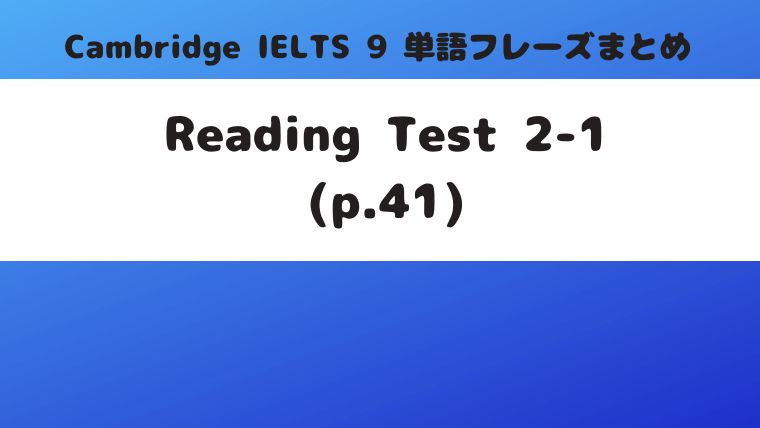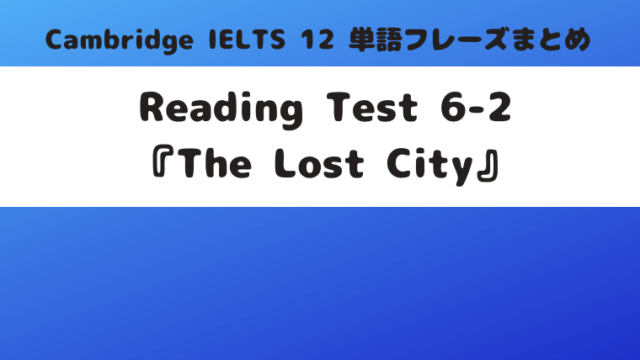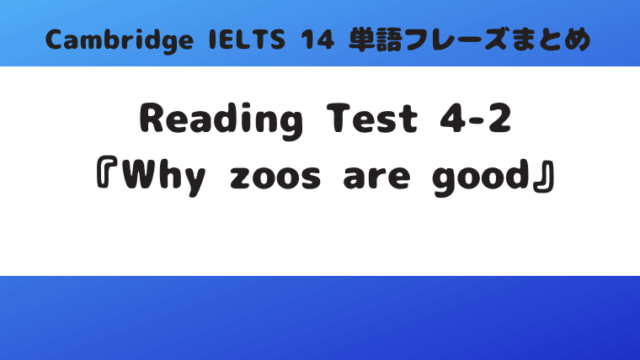「Cambridge IELTS 9」Reading Test 1-3『The history of the tortoise』(p.25)の単語・フレーズをまとめました。
私がIELTS Readingの単語・まとめを行う理由は「Cambridge IELTS Reading単語・フレーズまとめ」からご覧ください。
Reading Test 2 Passage 1
- impairment
noun /ɪmˈpeə.mənt/
・the act of spoiling something or making it weaker so that it is less effective
・specialized medical deterioration in the functioning of a body part, organ, or system that can be temporary or permanent and can result from injury or disease:
(身体機能の) 低下, 障害 - auditory
adjective /ˈɔː.dɪ.tər.i/
of or about hearing
聴覚の
(実践IELTS英単語3500:2607) - deficit
noun /ˈdef.ɪ.sɪt/
the total amount by which money spent is more than money received
不足, (財政の) 赤字, (スポーツで) 得点差
(実践IELTS英単語3500:1547) - detrimental
adjective /ˌdet.rɪˈmen.təl/
causing harm or damage:
有害な, 不利益な
(実践IELTS英単語3500:3043) - carry out
1 <…>を行う, 実施する
(1) 「(式典や儀式)を執り行う」の意味では conduct または perform を用いる
(2) 「(パーティーや集い)を催す」の意味では have または hold を用いる
2 <約束など>を果たす, <命令・指示など>を実行[遂行]する - preliminary
adjective /prɪˈlɪm.ɪ.nər.i/
coming before a more important action or event, especially introducing or preparing for it:
(調査・審理などが) 予備的な, (結果・契約などが) 仮の, (段階などが) 準備の
(実践IELTS英単語3500:1599) - acoustic
adjective /əˈkuː.stɪk/
relating to sound or hearing
used to refer to a musical instrument that is not made louder by electrical equipment
1 アコースティックの ((アンプを使わないで演奏される))
2 音響の
(実践IELTS英単語3500:2607) - ventilation
noun /ˌven.tɪˈleɪ.ʃən/
the movement of fresh air around a closed space, or the system that does this:
1 (部屋・建物などの) 風通し, 換気
2 (人工呼吸による) 肺換気 - heighten
verb /ˈhaɪ.tən/
to increase or make something increase, especially an emotion or effect:
a) 《他》 <緊張・効果など> を高める, <不安など> をあおる
b) 《自》 <緊張・効果などが> 高まる, <不安などが> 増す
(実践IELTS英単語3500:2464) - exacerbate
heighten
verb /ˈhaɪ.tən/
to increase or make something increase, especially an emotion or effect:
<症状・事態など> を悪化させる, 深刻にする
(実践IELTS英単語3500:3180) - comprehend
verb /ˌkɒm.prɪˈhend/
to understand something completely:
<難しいことなどを> 理解する, 把握する
(実践IELTS英単語3500:1890) - verbal
adjective /ˈvɜː.bəl/
・spoken rather than written:
・relating to words:
1 口頭(で)の
2 言葉の, 言葉(の使用)に関する
3 (身ぶりではなく) 言葉を用いた, 言葉による
4 〘専門〙 動詞の
(実践IELTS英単語3500:1628) - reverberation
noun /rɪˌvɜː.bərˈeɪ.ʃən/
・literary a sound that lasts for a long time and makes things seem to shake
・effects that spread and affect a lot of people
1 《C通例複数形で》 〘特に書き言葉〙 (出来事の) 反響, 波紋
同意 repercussion
2 《C, U》 反響音
(実践IELTS英単語3500:3374) - vulnerable
adjective /ˈvʌl.nər.ə.bəl/
able to be easily physically, emotionally, or mentally hurt, influenced, or attacked
1 <人が> (精神的・肉体的に) 傷つきやすい, 弱い
2 <場所などが> 攻撃されやすい, もろい, <考えなどが> 非難されやすい
(実践IELTS英単語3500:2007) - neurological
adjective /ˌnjʊə.rəˈlɒdʒ.ɪ.kəl/
relating to nerves
神経(病)に関する - discrepancy
noun /dɪˈskrep.ən.si/
a difference between two things that should be the same:
(陳述・計算などの) 不一致, 食い違い, 矛盾
(実践IELTS英単語3500:2716) - interlinking
adjective /ˌɪn.təˈlɪŋ.kɪŋ/
joining or connecting together:
1 《自》 密接に関連し合う, 結びついている
2 a) 《他》 …をつなぎ合わせる b) 《自》 つなぎ合わさる - sensory stimuli
感覚刺激 - autism
noun /ˈɔː.tɪ.zəm/
a condition that starts in young children and typically causes behaviour that is unusually centred on the self while limiting the development of social and communication skills
自閉症
(実践IELTS英単語3500:3415) - distress
noun /dɪˈstres/
・a feeling of extreme worry, sadness, or pain:
・a situation in which you are suffering or are in great danger and therefore in urgent need of help
1 苦悩, 心痛, 嘆き, 悲しみ
2 in distress
困窮して
3 in distress
<船・航空機などが> 遭難した
4 〘専門〙 激痛
(実践IELTS英単語3500:1637) - intrusive
adjective /ɪnˈtruː.sɪv/
affecting someone in a way that annoys them and makes them feel uncomfortable
立ち入った, でしゃばりな - adversely
adverb /ˈædvɜːsli/
in a way that is harmful or likely to cause problems
不利に, 逆に - penetrate
verb /ˈpen.ɪ.treɪt/
・to move into or through something:
・to succeed in becoming part of an organization, etc. and working within it :
・to reach or affect something:
・If your eyes penetrate somewhere dark, you manage to see through it:
・When a man penetrates his partner during sex, he puts his penis into his or her body
1 a) 《他》 …を貫通する, <光・声などが> …を通る
b) 《自》 penetrate into something
<…>に入り込む, しみ込む
2 a) 《他》 <場所など> に侵入する, を突破する
b) 《自》 penetrate into something
<…>に侵入する, 入り込む
3 a) 《他》 <地域・社会など> に広がる, 浸透する
b) 《自》 広がる
penetrate into something
<…>に広がる
4 《他》 <市場など> に進出する
5 《他》 <集団・組織など> に潜入する, 潜り込む
6 《他》 〘フォーマル〙 <難しいこと> を解き明かす, 解明する
7 《他》 〘書き言葉〙 <考え・事実などが> <人の頭など> にようやく入る
8 《他》 〘フォーマル〙 (性交で) …にペニスを挿入する
9 《他》 〘書き言葉〙 <暗がり・霧など> を見通す, 透かし見る
(実践IELTS英単語3500:) - reverberation
noun /rɪˌvɜː.bərˈeɪ.ʃən/
・literary a sound that lasts for a long time and makes things seem to shake
1 《C通例複数形で》 〘特に書き言葉〙 (出来事の) 反響, 波紋
同意 repercussion
2 《C, U》 反響音
(実践IELTS英単語3500:1810) - optimum
adjective /ˈɒp.tɪ.məm/
best; most likely to bring success or advantage:
最適の, 最善の
(実践IELTS英単語3500:3018) - embark
verb /ɪmˈbɑːk/
to go onto a ship
1 《自》 (船・航空機に) 乗り込む
反意 disembark
2 《他》 (船・航空機に) …を乗せる, 積み込む
反意 disembark
3 《自》 embark on something
<旅>に出る
(実践IELTS英単語3500:2304) - impaired
adjective /ɪmˈpeərd/
damaged or weakened
<能力・機能などが> 低下した, <健康などが> 損なわれた - take into account
<…>を考慮する, 考慮に入れる
(実践IELTS英単語3500:) - promulgate
verb /ˈprɒm.əl.ɡeɪt/
・to spread beliefs or ideas among a lot of people
・to announce something publicly, especially a new law:
1 <思想・信仰など> を普及させる, 流布させる 同意 disseminate
2 <法律・規制など> を公布する, (公布して)施行する





』は英語学習に最適-320x180.png)






